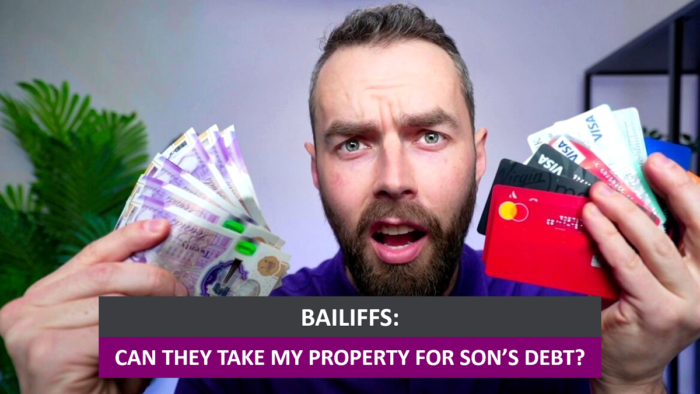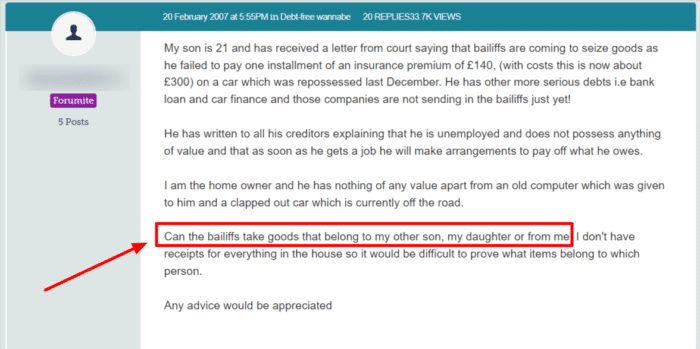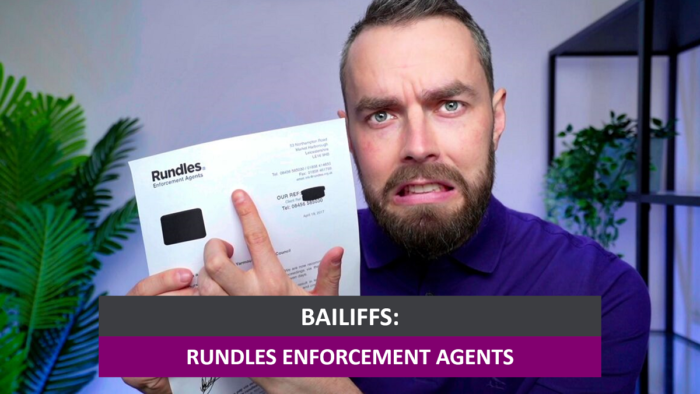Can Bailiffs Take My Property for My Son’s Debt?
For free & impartial money advice you can visit MoneyHelper. We work with The Debt Advice Service who provide information about your options. This isn’t a full fact-find, some debt solutions may not be suitable in all circumstances, ongoing fees might apply & your credit rating may be affected.

For free & impartial money advice you can visit MoneyHelper. We work with The Debt Advice Service who provide information about your options. This isn’t a full fact-find, some debt solutions may not be suitable in all circumstances, ongoing fees might apply & your credit rating may be affected.
It can be very concerning when a bailiff company says they might take your things. This is even scarier when it’s for your son’s debt, not yours.
But don’t worry, you’ve come to the right place. Each month, over 170,000 people visit our website looking for information about their debt problems.
This article is here to help you understand:
- The laws for 2023 on whether bailiffs can take your property for your son’s debt.
- What to do if a bailiff comes to your door because of your son’s debt.
- What things bailiffs can’t take.
Citizens Advice estimates households have around £18.9 billion in unpaid bills like council tax and utilities1. So you’re not alone – it’s quite common to feel concerned about debt.
With our experience, we’ll help you learn how to stop bailiffs from causing you worry and stress.
Dealing with a Notice of Enforcement from Bailiffs Regarding Your Son’s Debt
Keep in mind that the FCA states that a bailiff must not misrepresent their authority or legal position and cannot suggest that an action may be taken where it legally can’t.2
What Should You Do if a Bailiff Shows Up at Your Doorstep Regarding Your Son’s Debt?
I shared with The Mirror how important it is to know your rights when faced with bailiffs at your front door.
» TAKE ACTION NOW: Fill out the short debt form
How a debt solution could help
Some debt solutions can:
- Stop nasty calls from creditors
- Freeze interest and charges
- Reduce your monthly payments
A few debt solutions can even result in writing off some of your debt.
Here’s an example:
Situation
| Monthly income | £2,504 |
| Monthly expenses | £2,345 |
| Total debt | £32,049 |
Monthly debt repayments
| Before | £587 |
| After | £158 |
£429 reduction in monthly payments
If you want to learn what debt solutions are available to you, click the button below to get started.
What Should You Do if a Bailiff is Trying to Take Something That Belongs to You?
Thousands have already tackled their debt
Every day our partners, The Debt Advice Service, help people find out whether they can lower their repayments and finally tackle or write off some of their debt.

Natasha
I’d recommend this firm to anyone struggling with debt – my mind has been put to rest, all is getting sorted.
Reviews shown are for The Debt Advice Service.
What Should You Do if Bailiffs Take Something That Belonged to You?
If the creditor won’t deal with the matter, you can make a complaint to the Financial Ombudsman Service (FOS). This is because all companies that provide financial services must adhere to the Financial Conduct Authority’s (FCA) guidelines and rules of conduct.
Taking someone else’s property goes against their rules!
You may also be able to make a complaint to the Civil Enforcement Association (CIVEA) which most bailiffs are members of.
If bailiffs have already sold your belongings, your only option may be to take the firm to court in order to get your money back.
What are Some Things They Cannot Take?
- tables
- chairs
- beds
- a cooker
- microwave
- fridge
- mobile phone.
Do Bailiffs Have a Right of Entry?
- Unpaid fines that were given for criminal activity
- Magistrate court fines
- Income tax
- Stamp duty.
You may also find that bailiffs can force entry to collect council tax arrears, but this isn’t quite the full picture!
Bailiffs can only force entry for council tax arrears if they have already been inside your home before after you invited them in, if the doors were open, or if you allowed them in again. When in doubt, don’t invite them in!
Being aware of your rights can make the situation less stressful. Take this example:

Knowing that bailiffs can’t force entry for unsecured debts – like her son’s insurance premium – or take other people’s belongings would probably ease some of their stress about the situation!
Your Rights With Bailiffs
Here’s a table delving deeper into bailiffs’ rights.
| Bailiffs Can | But They Can’t |
|---|---|
| Call and visit your home multiple times, any day of the week. | Visit your workplace (if you are not self-employed) |
| Take items from your home. These items have to be considered ‘luxury’. | Take essential items from your home. This includes beds, clothing, and work equipment. |
| Use ANPR technology and DVLA information to locate your car and take it. | Enter your home without permission unless they have a warrant to force entry for a CCJ. |
| Peacefully enter your property. | Harass or threaten you. |
| Issue notices to those who owe a debt. | Take items that belong to someone else. However, they may be able to seize jointly owned property. |
| Offer to conduct a Virtual Controlled Goods Agreement (rather than in-person). This will typically be offered to vulnerable people. | Sell goods they have seized at auction until seven clear days have passed. |



